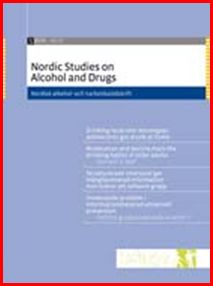An international website dedicated to providing current information on news, reports, publications,and peer-reviewed research articles concerning alcoholism and alcohol-related problems throughout the world. Postings are provided by international contributors who monitor news, publications and research findings in their country, geographical region or program area of interest. All postings are entered without editorial or contributor opinion or comment.
Aims
To support the free and open dissemination of research findings and information on alcoholism and alcohol-related problems. To encourage open access to peer-reviewed articles free for all to view.
For full versions of posted research articles readers are encouraged to email requests for "electronic reprints" (text file, PDF files, FAX copies) to the corresponding or lead author, who is highlighted in the posting.
___________________________________________
For full versions of posted research articles readers are encouraged to email requests for "electronic reprints" (text file, PDF files, FAX copies) to the corresponding or lead author, who is highlighted in the posting.
___________________________________________
Thursday, October 7, 2010
Editorial - Cost analyses: requested and questioned
Writing in 1930, the Swedish economist Gunnar Myrdal was far from happy about contemporary attempts to produce a total profit and loss account of alcohol for society in the name of justifying a restrictive alcohol policy. He did not mince his words: “The problem lies in the notion of ‘society’ as an appraising and goal-setting subject... In terms of doctrinal history, cost analyses are a legacy of classical and neo-classical economic theory. Talk of “costs to society” turns the most atomistic, individualistic social theory in history into untenable, purely communist fiction… Like psychoanalysis and patented drugs, political economy gains popular ground in a way that makes all decent workers in these research fields shudder. Here lies a great cultural danger: nothing has such a frightening potential to “rationalise”, dehumanise and petrify the socio-ethical forces as these supposedly scientific and economic social summations. ” (Myrdal 1930, quoted in Österberg 1978, 47–48). According to Myrdal, such calculations are meaningless, nothing for honest researchers, and they lead political decision-makers astray. > > > >
Read Full Editorial
